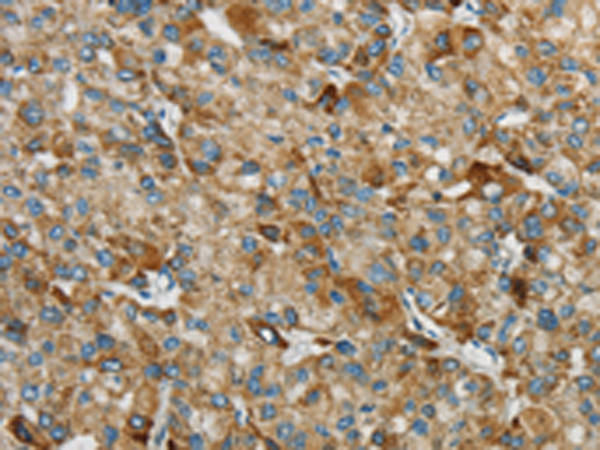

| WB | 咨询技术 | Human,Mouse,Rat |
| IF | 咨询技术 | Human,Mouse,Rat |
| IHC | 1/25-1/100 | Human,Mouse,Rat |
| ICC | 技术咨询 | Human,Mouse,Rat |
| FCM | 咨询技术 | Human,Mouse,Rat |
| Elisa | 1/1000-1/2000 | Human,Mouse,Rat |
| Aliases | COR1; SCP3; SPGF4 |
| WB Predicted band size | 28 kDa |
| Host/Isotype | Rabbit IgG |
| Antibody Type | Primary antibody |
| Storage | Store at 4°C short term. Aliquot and store at -20°C long term. Avoid freeze/thaw cycles. |
| Species Reactivity | Human, Mouse, Rat |
| Immunogen | Synthetic peptide of human SYCP3 |
| Formulation | Purified antibody in PBS with 0.05% sodium azide and 50% glycerol. |
+ +
以下是关于SYCP3抗体的参考文献示例(注:部分信息为示例性概括,建议通过学术数据库核实具体文献):
1. **文献名称**: *SYCP3 is required for synaptonemal complex assembly and homologous chromosome pairing during mammalian meiosis*
**作者**: Yuan L, et al.
**摘要**: 研究通过SYCP3抗体检测发现,SYCP3蛋白对哺乳动物减数分裂中联会复合体的形成和同源染色体配对至关重要,其缺失导致生殖细胞减数分裂停滞和不育。
2. **文献名称**: *Mutations in SYCP3 are associated with human male infertility and disrupt meiotic progression*
**作者**: Tüttelmann F, et al.
**摘要**: 利用SYCP3抗体分析患者睾丸样本,发现SYCP3基因突变导致蛋白功能异常,与男性不育相关,表现为减数分裂异常和精子发生障碍。
3. **文献名称**: *Spatiotemporal dynamics of SYCP3 during meiotic prophase I in mouse spermatocytes*
**作者**: Steiner A, et al.
**摘要**: 通过SYCP3抗体的免疫荧光定位,揭示了该蛋白在小鼠精母细胞减数分裂前期I的动态分布,阐明其在染色体联会和重组中的阶段性作用。
4. **文献名称**: *Overexpression of SYCP3 in ovarian cancer correlates with poor prognosis*
**作者**: Liu Y, et al.
**摘要**: 研究利用SYCP3抗体检测卵巢癌组织,发现SYCP3异常高表达与肿瘤恶性程度及患者预后不良相关,提示其可能作为潜在生物标志物。
建议通过PubMed或Web of Science以“SYCP3 antibody”为关键词检索获取最新及具体文献。
The SYCP3 (Synaptonemal Complex Protein 3) antibody is a widely used tool in reproductive biology and meiosis research. SYCP3 is a key structural component of the synaptonemal complex (SC), a proteinaceous framework essential for chromosome pairing, recombination, and segregation during meiosis. It plays a critical role in maintaining the integrity of meiotic chromosomes, facilitating homologous chromosome synapsis, and ensuring proper crossover formation.
SYCP3 antibodies are primarily employed to detect and localize the SYCP3 protein in meiotic cells, enabling visualization of SC assembly dynamics across different meiotic stages (e.g., leptotene, zygotene, pachytene). These antibodies are instrumental in studying germ cell development, infertility, and meiotic defects linked to conditions like azoospermia or premature ovarian insufficiency. They are commonly used in techniques such as immunofluorescence, immunohistochemistry, and Western blotting, often in model organisms (mice, humans) or clinical samples.
Research using SYCP3 antibodies has advanced understanding of meiotic regulation, DNA repair mechanisms, and aneuploidy origins. Additionally, they serve as biomarkers in fertility diagnostics and toxicology studies assessing environmental impacts on gametogenesis. Commercial SYCP3 antibodies are typically raised in rabbits or mice against conserved epitopes, ensuring cross-species reactivity. Recent studies also explore SYCP3's non-meiotic roles in somatic cells, such as DNA damage response, broadening its biomedical relevance.
×